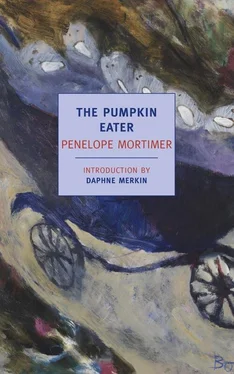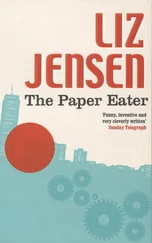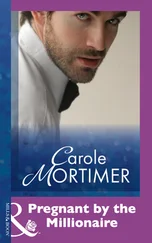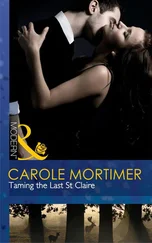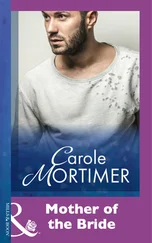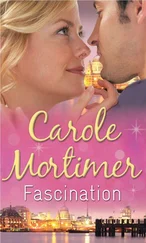“What are you going to do, then?” I asked.
“Go downstairs again, of course.”
“But you can’t! Suppose Mummy finds you?”
“If you think I care about your mother,” she said, “you’re crazy.”
“But what are you going to do ?”
She took a breath, looked at me and swallowed it. Then she got up in her evening dress and went to the light switch, acting just like a mother in a story by Galsworthy. “Goodnight,” she said sweetly, “Sleep well.” Then she turned out the light and was gone. I did not hear her go down the stairs. She must have taken her shoes off.
I lay awake for about half an hour, waiting for her to come back. I was frightened about what my parents would say if they found her wandering about the house after bedtime. Anyway, I thought, my father was downstairs. He would deal with her. When I woke up again it was midnight. She had not come back. I thought vaguely of going to look for her, but fell asleep while wondering where to look. The next morning she was neatly tucked up in bed, but had not taken her make-up off. It had streaked all over her face; she looked as though she had been left out in the rain. I spoke to her hesitantly.
“Was it all right… last night?”
“Was what all right?” She was again the Ireen I knew at school: arrogant, off-hand, not bothering about herself.
“Well, I mean … did they find you?”
She laughed at me. “I’ll leave you those mags,” she said. “You ought to read them sometime.”
“Thanks. I will.”
“And good luck with that vicar’s son of yours. I suppose you’ll be necking with him again now — when I’ve done gone, I mean.”
My father drove us to the station. Ireen kissed us both goodbye. “Thanks,” she said, “for the most gorgeous time.”
“Come again,” my father said. “We’d love to have you.”
“Thank you,” she said. “I’ll remember that.”
My father and I looked at each other blankly when the train had gone. “Well, old thing,” he said. “Back to work.” I followed him out of the station, and the strange thing was that I felt sad. It was almost as though Ireen had stolen the clergyman’s son from me after all. I felt deserted, and puzzled, and sad.
10
My father loved me, I know, in his self-sufficient way. For years he regretted that I wasn’t a boy, but after Ireen’s visit his attitude seemed to change and during the following, the Christmas holidays, he really began to take some sort of tentative pride in me. My mother too stopped pushing and shoving me quite so much, and resigned herself to my straight hair. I began reading the women’s magazines, starting with the ones that Ireen had left behind, and learned many useful facts such as that all men are children, all men are emotionally immature, all men dislike hairnets and criticism, all men are unfaithful, must be trusted, need hot breakfasts, want more than they should have and need more than they are given. As I never thought of the clergyman’s son as a man, I didn’t apply any of this to him. I would not believe, even when he changed so strangely, that he was childish or half-witted — and there, according to Ireen, I made my mistake.
We met as usual on the second day of the holidays. He was staring into the window of the bicycle shop, where all the torches and spanners were wreathed in tinsel. I was wearing an old overcoat of my mother’s, since I had grown out of last winter’s, and had belted it tightly with a short luggage strap. I had also dabbed my nose with my mother’s natural powder and was wearing a suspender belt: but this he couldn’t possibly have known. He had grown even taller and his wrists were blue with cold. When I said hullo he whirled round, knocking over two scooters. I propped them up again while he stammered, “Hullo … Gosh … Didn’t see you … I was just…”
“Let’s go to the Copper Kettle.”
“No. No. I can’t. I have to … Which way are you going?”
“Oh, down the High Street. Are you going down the High Street?”
“No … Must dash home, do some work …” He peered at me through the flag of hair that continually fell over his eyes. He combed it through with his fingers and said, “Gosh. You’ve changed.”
“Have I?” I should have said no, I haven’t, and told the truth.
“Yes. Well… Goodbye.”
I was sad, but not heart-broken. He had often behaved like this in the past. On my way home I called in at the factory to see my father. He greeted me warmly, and for the first time the clerks stood up when I came in. “I’m just going to do the tour,” he said — every week he went round seeing every man, woman and boy, this was his great argument for private enterprise — “Come along, they’d like to see you.”
So he conducted me round the factory — seeming to forget that I had known it all my life, every dry-smelling, dusty corner of it — and introduced me to the men, most of whom had let me work their looms since my arms were eight inches long, many of whom had saved me from being scalped in the rope-walk or stabbed to death by the great matting needles. I appreciated this, realizing that I had a new status. I bowed gravely to the Mongol boy who wound the rope round huge reels; his top-heavy head nodded like a mandarin and his arms made winding motions all the time he was awake. I sat on a stool in the office, with its water-colours of Kashmir and the Punjab, and examined my grandfather’s quill pens, pretending it was the first time. “I suppose it’s not impossible,” my father said, as we drove home for lunch, “for a woman to run a business …” Then he made a wry face and patted my knee, rejecting the idea.
I didn’t see the clergyman’s son again until Christmas Day. He and his mother — a silly, insipid woman I thought her — sat in the pew in front of us in church, and all though the service I loved, with a new element of pain, the tender back of his neck, the shoulder-blades in the school suit, the raw, clumsy hands clasped (was he praying?). As we filed out of the church he smiled at me, and in the porch he said. “Happy Christmas.”
“Happy Christmas.”
“What did you get?”
“Oh … lots of things. A gramophone. What did you get?”
“I got a gramophone too.” It was a delightful coincidence. We were really pleased. I longed so much to kiss him that I felt weak, almost tearful in spite of my pleasure.
“We might go to the flicks next week,” he said.
“Oh, yes. Yes, that would be lovely.”
“I’ll come round on Wednesday.”
“ Yes … But oh no, I can’t! I can’t on Wednesday! I’ve got to go to this awful old Rotary thing with my father — ”
“It doesn’t matter.” He had already turned away.
“But it does matter! You see, Mummy hates going, so he said this year he’d take me, and I don’t want to go either! Can’t we go on Tuesday?”
“No, I can’t go on Tuesday,” he said. “It doesn’t matter.” And he was off across the churchyard in his navy blue overcoat and new Christmas scarf. Six months before, I would have run after him. Now I stood still among the church-goers, my gloved hands clenched in my pockets, calling out inside myself don’t go, don’t go, please, I love you so much …
“You’ll ruin the hang of that coat,” my mother said, “if you put your hands in the pockets like that. You must learn that good clothes have to be worn well, otherwise you’ll always look a little rapscallion.”
So on Wednesday my father took me to the Rotary dinner, where I was given a gilded powder compact engraved with my mother’s initials. It was intensely boring, but they all made a great fuss of me and I began to think that perhaps it was better to be bored and admired than interested and miserable. I tried flapping my eyelashes and was amazed when old men I had known all my life went pink, and giggled, and even offered me cigarettes. “She behaved beautifully,” my father told my mother, who was waiting up with Ovaltine. “A perfect lady. It’s something, you know, to have a daughter you can be proud of.”
Читать дальше
